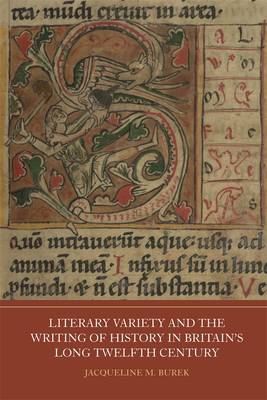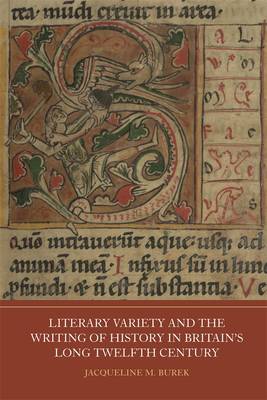
- Retrait gratuit dans votre magasin Club
- 7.000.000 titres dans notre catalogue
- Payer en toute sécurité
- Toujours un magasin près de chez vous
- Retrait gratuit dans votre magasin Club
- 7.000.0000 titres dans notre catalogue
- Payer en toute sécurité
- Toujours un magasin près de chez vous
Literary Variety and the Writing of History in Britain's Long Twelfth Century
Jacqueline M Burek
209,45 €
+ 418 points
Description
A survey of the different literary forms adopted by history writers after the Conquest, exploring why and for what effects they were used. Histories of Britain composed during the "twelfth-century renaissance" display a remarkable amount of literary variety (Latin varietas). Furthermore, British historians writing after the Norman Conquest often draw attention to the differing forms of their texts. But why would historians of this period associate literary variety with the work of history-writing?
Drawing on theories of literary variety found in classical and medieval rhetoric, this book traces how British writers came to believe that varietas could help them construct comprehensive, continuous accounts of Britain's past. It shows how Latin prose historians, such as William of Malmesbury, Henry of Huntingdon, and Geoffrey of Monmouth, filled their texts with a diverse array of literary forms, which they carefully selected and ordered in accordance with their broader historiographical aims. The pronounced literary variety of these influential histories inspired some Middle English verse chroniclers, including Laȝamon and Robert Mannyng, to adopt similar principles in their vernacular poetry. By uncovering the rhetorical and historiographical theories beneath their literary variety, this book provides a new framework for interpreting the stylistic and organizational choices of medieval historians.
Drawing on theories of literary variety found in classical and medieval rhetoric, this book traces how British writers came to believe that varietas could help them construct comprehensive, continuous accounts of Britain's past. It shows how Latin prose historians, such as William of Malmesbury, Henry of Huntingdon, and Geoffrey of Monmouth, filled their texts with a diverse array of literary forms, which they carefully selected and ordered in accordance with their broader historiographical aims. The pronounced literary variety of these influential histories inspired some Middle English verse chroniclers, including Laȝamon and Robert Mannyng, to adopt similar principles in their vernacular poetry. By uncovering the rhetorical and historiographical theories beneath their literary variety, this book provides a new framework for interpreting the stylistic and organizational choices of medieval historians.
Spécifications
Parties prenantes
- Auteur(s) :
- Editeur:
Contenu
- Nombre de pages :
- 294
- Langue:
- Anglais
- Collection :
- Tome:
- n° 10
Caractéristiques
- EAN:
- 9781914049101
- Date de parution :
- 10-01-23
- Format:
- Livre relié
- Format numérique:
- Genaaid
- Dimensions :
- 156 mm x 234 mm
- Poids :
- 589 g

Les avis
Nous publions uniquement les avis qui respectent les conditions requises. Consultez nos conditions pour les avis.






